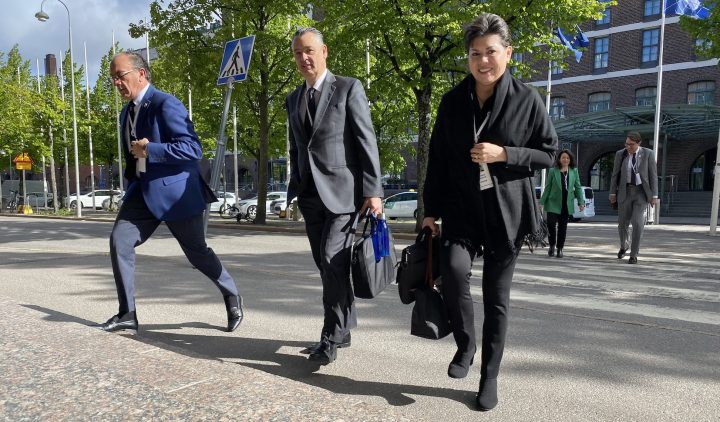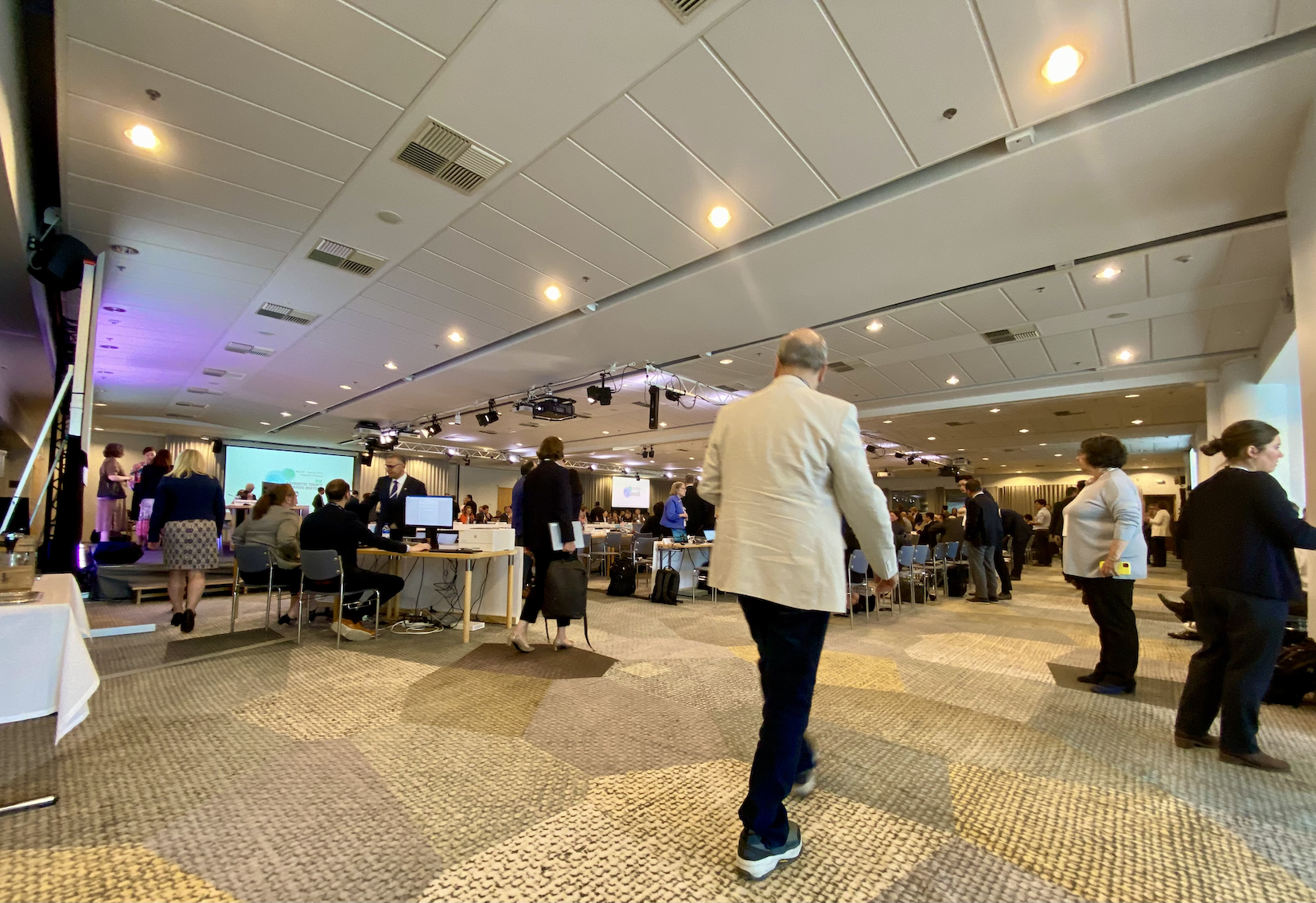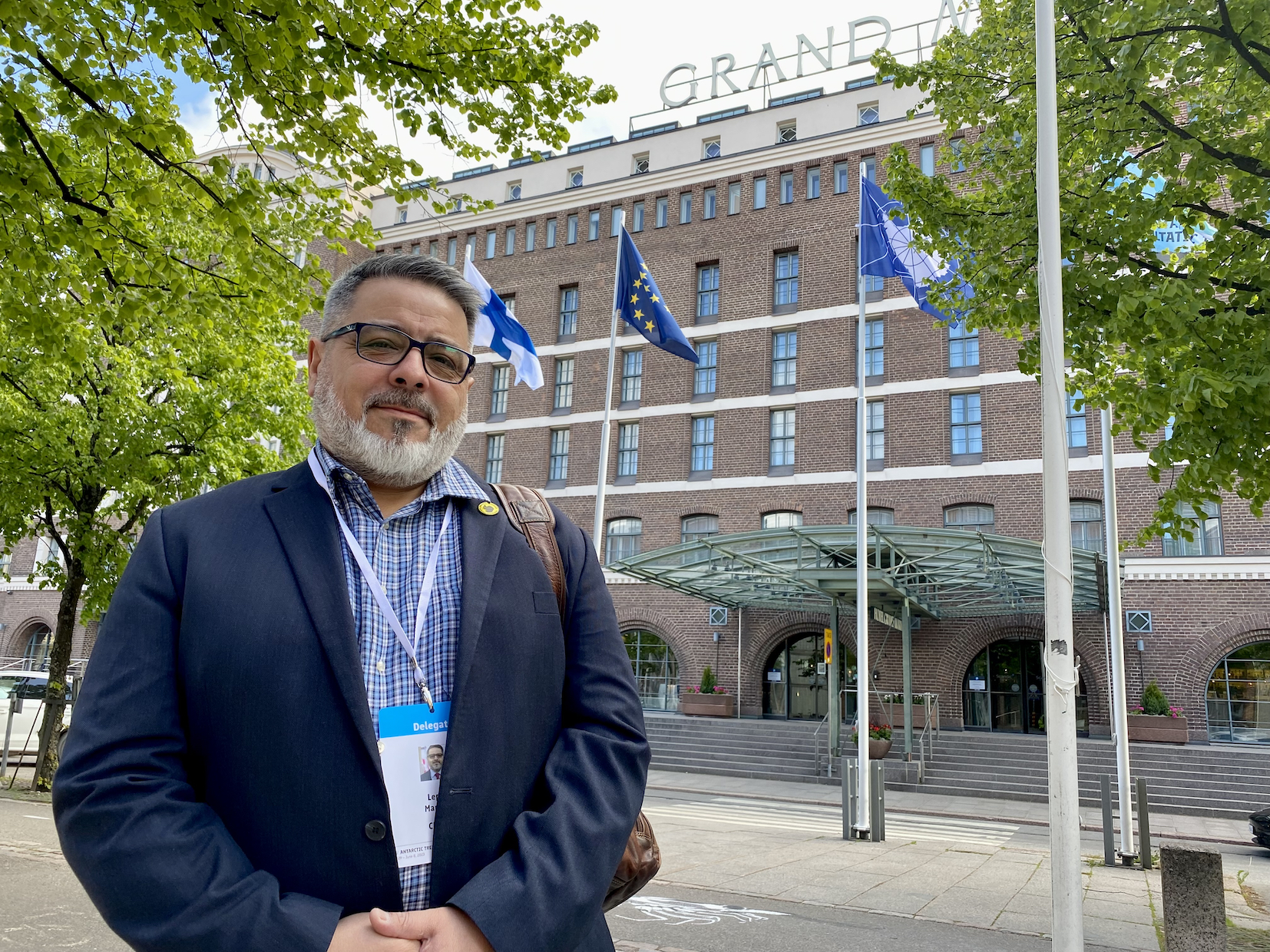45TH ANTARCTIC TREATY CONSULTATIVE MEETING
Helsinki or high water? Summit tackles Antarctica’s desperate battle

Decades since the world first learnt about human-caused climate change and rising sea levels, the climate emergency is finally getting its day in Antarctic politics.
Helsinki, Finland – World scientific experts on Antarctica, alongside diplomats from consultative and non-consultative parties, braved the biting chill of a typical Helsinki summer on Friday morning, as they convened for the first-ever full-day climate session at an Antarctic Treaty consultative meeting.
Forming part of the two-week meeting lasting until Thursday, 8 June, this day forms the first of its kind in the 60-plus years since the 1959 Antarctic Treaty was signed. It intends to address the pressing issues of the climate crisis and its “far-reaching impacts” on Antarctica.
Finland, among a handful of states to serve on the Arctic Council and enjoy Antarctic decision-making status, is hosting the consultative meeting for the first time – now hosted for the 45th time.
Arriving in a cheek-biting wind with temperatures dipping to 6°C, some delegates told Daily Maverick that the day’s climate session aimed to share knowledge and best practices among experts. If all went to plan, it would culminate in the “Helsinki Declaration”, which would be designed to convey the Antarctic community’s climate concerns to the global public.
Bringing together about 400 diplomats and polar specialists from more than 50 countries, including Australia, Ecuador and China, the meeting serves as a so-called platform for peaceful research, as envisioned by the Antarctic Treaty.
There are currently 29 consultative states and 27 non-consultative states – the former have decision-making rights, the latter zero. Indeed, this is a tall order for an elite club: protecting the continent and surrounding ocean’s use exclusively for scientific purposes and prohibiting territorial claims, military operations, nuclear explosions and the dumping of radioactive waste.
Not quite pristine
With its extreme cold, white aridity and relentless winds, Antarctica remains the world’s most untainted wilderness and has no permanent settlements or indigenous populations. That does not mean it is untainted or free from the effects of irreversible damage.
Changes were “happening around us”, State Secretary Johanna Sumuvuori of Finland’s foreign affairs affairs ministry told delegates at Tuesday’s 25-minute opening ceremony, which was briefly open to the media. “Even though they may seem slow, they will inevitably affect life on Earth and its inhabitants now and in the future. We have received enough scientific evidence to know that these changes are irreversible and call for urgent action.”
Among other looming environmental crises, abandoned dumps of rubbish mar ice-free areas where some stations are built and marine life also like to be. And, according to the Finnish foreign ministry, the climate crisis is “leaving deep scars in Antarctic nature and ecosystems”, contributing to “rising sea levels from melting glaciers”.
Today’s #ATCM45/CEP joint session on climate change could not have been opened with a more powerful, pressing or appropriate message.
Thank you @valmasdel for your ongoing contribution to the effective communication of climate science 🙏 https://t.co/X5hg088BAs
— Nina Gallo 🇦🇺 🇦🇶 🇪🇺 (@NinaBGallo) June 2, 2023
These annual consultative meetings, regardless of the host country, have a traditional closed-door policy. Although no media were allowed into the meeting hall to witness Friday’s historic event, several – although not all – delegates were willing to speak to Daily Maverick, which appeared to be the only news organisation on the scene.
South Africa and Russia, seated side-by-side at the delegate table due to alphabetical arrangements, are also attending the meeting as consultative countries and founding signatories of the 1959 agreement.
As reported by Daily Maverick, both countries during Tuesday’s opening ceremony opted out of joining most other consultative states during a thunderous standing ovation. Delegates had leapt to their feet for a keynote speech by the youth climate activist Helena Gualinga, but not South Africa and Russia.
Diplomacy is ‘catching up’
Evan Bloom, who led Antarctic policy as chief US delegate to Antarctic consultative meetings from 2006 to 2020, told us that “diplomacy is catching up to the reality of the world”.
“These days climate change is the forefront issue for Antarctic policy, and so it is great that the treaty parties have decided that they will spend a day focusing on the issue,” said Bloom, who also previously led US negotiations on Antarctic marine conservation and fishing talks, and helped establish the Arctic Council at the opposite end of the Earth. He is now on the delegation of the treaty’s non-profit observers, the Antarctic and Southern Ocean Coalition.

A peek inside the meeting hall of the 45th Antarctic Treaty Consultative Meeting on Tuesday, when media were allowed into the room for the opening ceremony. (Photo: Tiara Walters)
Asked about the hard problem of addressing climate change caused outside the Antarctic, Bloom said: “Climate change is happening everywhere, but we live in an interconnected world, so everyone benefits from the kind of focus being brought to bear in this building today.”
Delegates would be “discussing in particular how Antarctic science is relevant to the rest of the world and has an impact on understanding climate change: issues like sea-level rise, helping the 2015 Paris Agreement process and how science can be cooperatively improved”.
Olaf Eisen, a glaciologist at Germany’s Alfred Wegener Institute, seemed unconvinced that all consultative diplomats expected to attend the day had yet grasped the seriousness of scientific warnings.
“I hope today will clarify what science is happening in Antarctica. We have to act immediately in order to protect Antarctica, its species and ice sheet in order to avoid damage for humanity in the future,” he said.
Tipping point – already there?
“Climate change is playing out very slowly in this system, but if it plays out, especially sea-level rise, it will be catastrophic. We are worried, as scientists, that we have reached a tipping point,” added Eisen. “Very important on a shorter timescale are biodiversity and the conservation of species. We hope that as scientists we can convey this message to delegates in a concerted way.”
Eisen said Valérie Masson-Delmotte, a working group co-chair of the Intergovernmental Panel on Climate Change (IPCC), was expected “to represent the case from their side”.
The Scientific Committee on Antarctic Research (SCAR) – the science advisory body to the treaty – would also present data.
“In the afternoon it would be about the declaration,” said Eisen, citing the mooted Helsinki Declaration. “This will be the critical part.”

Chile’s Marcelo Leppe Cartes arrives at the consultative meeting in the Finnish capital on Friday. He hoped commitments would materialise through the Helsinki Declaration. (Photo: Tiara Walters)
Chief Portuguese delegate José Xavier said the milestone, full-day climate session marked the “first time that everyone would recognise that climate change is a very important issue to the consultative meeting and to the Antarctic region – it’s a unique opportunity for everyone around the table to express their opinions”.
An oceans and climate expert serving on SCAR, Xavier said “it is critical not only to acknowledge that the problem exists, but what actions some of the parties are engaged in trying to find solutions – from the Antarctic perspective, but also to link to what countries are doing at a national level”.
Both the Arctic and Antarctic revealed “the most dramatic expression of climate change”, said Marcelo Leppe Cartes, a Chile delegate and the director of the Chilean Antarctic Institute. Chile is also a founding signatory – one among 12 founding countries that include the US as treaty depositary.
Later in June, Chile is hosting a special Antarctic meeting on marine protected areas – consistently blocked by Russia and China in recent years. Leppe Cartes said a successful outcome at Friday’s climate session would be demonstrating a commitment via the anticipated Helsinki Declaration.
It seems inconsistent with this day, then, that Russia has been looking for oil and gas in Antarctica’s Southern Ocean via Cape Town for 25 years, despite the mining ban which prohibits mineral-resource activities but not science. Kremlin mineral explorer Rosgeo has told us its work here was just science, while also expressing the desire to potentially mine the Antarctic in the long-term.
The Antarctic Treaty’s Committee for Environmental Protection has not responded to our detailed questions about the matter.
South Africa’s national environmental department – which oversees the country’s Antarctic affairs – told Daily Maverick it was committed to the Antarctic Treaty’s governance and conservation frameworks. DM
Tiara Walters is a full-time reporter for Daily Maverick’s Our Burning Planet unit. Walters’s travel to Helsinki has been made possible, in part, by the support of the Friedrich Naumann Foundation and the Finnish Embassy of South Africa.

To read all about Daily Maverick’s recent The Gathering: Earth Edition, click here.


















 Become an Insider
Become an Insider
“Tiara Walters is a full-time reporter for Daily Maverick’s Our Burning Planet unit. Walters’s conference accommodation in Helsinki is sponsored by the Finnish Embassy of South Africa. Air travel and additional accommodation are sponsored by the Friedrich Naumann Foundation.”
Thank you for adding the above! Transparency is a great thing and excludes any wrong conclusions.